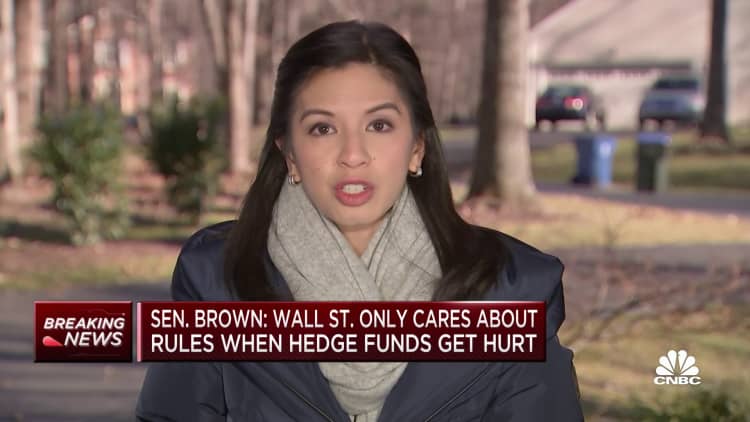Stock trading app Robinhood and Reddit group WallStreetBets have been making headlines this week after investors dramatically drove up the prices of GameStop, AMC and other individual stocks. But now some are questioning whether this is a stunt or a scam.
After the meteoric rise of GameStop stock, from about $4 a share six months ago to $483 a share on Thursday morning, Robinhood and other trading platforms restricted trades on certain securities, including GameStop and AMC.
"Amid this week's extraordinary circumstances in the market, we made a tough decision today to temporarily limit buying for certain securities. As a brokerage firm, we have many financial requirements," Robinhood said in a statement. "These requirements exist to protect investors and the markets and we take our responsibilities to comply with them seriously, including through the measures we have taken today."
With many retail investors (also known as non-professional individual investors) locked out for the moment, the trading frenzy around these stocks, particularly GameStop, is now being called a "pump and dump" scheme by both traders and outside experts.
Typically a pump and dump scam occurs when fraudsters boost the company's stock price by sharing positive, but fake, information. Scammers buy up the shares cheap before spreading the rumors that drive the stock price higher and higher and encourage other investors to get in on the supposed windfall. When the stock hits a high point, the scammers dump their shares, leaving unsuspecting investors holding the bag.
No evidence showing GameStop is a scam...yet
As of now, there's no real concrete ruling that GameStop is a classic case of a pump and dump scam. With GameStop, many retail investors, especially those tuned into the WallStreetBets subreddit, say they bought up the company's stock because they wanted to squeeze hedge funds that have been betting GameStop will fall apart.
Some traders have also seen Chewy CEO Ryan Cohen's recent purchases of GameStop stock as a sign that the company could be ripe for investment. Cohen made several big stock purchases starting last year that added up to a 12.9% stake and eventually joined the board, leading to speculation that there could be a reorganization or modernization of the company in the near future.
When it comes to federal securities laws, the reason behind the actions matter, says Eric Chaffee, a law professor who specializes in securities laws and regulations at The University of Toledo. In the case of GameStop, the question will be: Is this situation just people stating their opinions very loudly or is it a concerted effort, either intentionally, knowingly or recklessly, to manipulate the value of the stock?
"Any time that you have individuals who purchase a block of stock, tout that stock as being absolutely wonderful — where they are stating that it's undervalued and it's going to continue to appreciate in value — for purposes of manipulating the market, that is a violation of the securities laws," Chaffee says.
Proving that driving up the price of GameStop stock was a concerted effort with the intent to defraud is a tricky thing, Chaffee says. That said, although there might not have been a clear securities violation uncovered as of yet, the current highs of the GameStop stock are not likely to last. And when investors start bailing, there will be some left holding a bunch of much less valuable shares.
That's probably reason enough for many investors to steer clear of this situation for now, even if it's not been officially labeled a scam by regulators like the U.S. Securities and Exchange Commission.
Broker dealers "wash their hands" of the situation
The recent volatility of the stock and the ongoing uncertainty around the situation, more than anything, may be the reason Robinhood and other broker dealers have restricted trading. "The reason why trading has been restricted is because those broker dealers are concerned about what's going on here, " Chaffee says.
Chaffee believes Robinhood and other platforms likely don't want to be involved in this in case it turns out that there was some sort of wrongdoing going on. Additionally, brokerages also may want to protect themselves so they're not liable to pay if customers come up short. "They have just decided to wash their hands, at least temporarily, regarding trading on the stock," Chaffee says.
While the rules and regulations around broker dealers is a complex web, "helping to facilitate securities fraud is something that can get broker dealers into trouble and into trouble quickly," Chaffee says. At the same time, halting trading does raise questions around the equity of access to the market, especially if hedge funds can continue trading while retail investors are barred.
"Restricting the buying or selling of certain securities, especially in a volatile scenario like this, leaves many retail traders holding the bag and the large financial institutions laughing their way to the bank once again," says Gust Kepler, CEO of BlackBoxStocks, a popular options analytics tool and trading community.
Brokerages like Interactive Brokers also said that restricting trading of speculative stocks like GameStop was also done to safeguard the market. "We are worried about the integrity of the marketplace and the clearing system," Interactive Brokers chairman Thomas Peterffy said on CNBC's "Closing Bell" on Thursday.
If interest continues, it would not be surprising for this case to spur additional rules and regulations around online trading activity and access to the markets, Chaffee says.
Check out: A poor credit score affects more than just getting a loan or credit card
Don't miss: Here are the 5 best personal loans of December 2020



